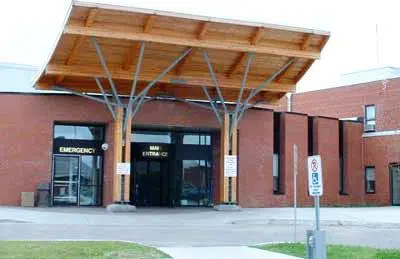
Dryden Regional Health Centre/CKDR Files
A new social worker position has been created at the Dryden Regional Health Centre to support Indigenous patients.
The Bimaadiziwin Ashangewinini (“Seeking the Good Life Social Worker” from the Anishinaabe language) works to provide advocacy supports, case management and coordinate referrals to programs and services, community resources and traditional healers to ensure Indigenous clients receive compassionate, culturally-safe care to help them towards their healthcare goals.
Mark Gonske took on the role in March and has since provided counselling, supports and resources to patients reporting to the Emergency Department, as well as follow-up and referrals following their discharge.
In this role, Gonske also provides proactive support to First Nations communities in the area when requested to improve the mental health and wellbeing of their community members.
“It has been both challenging and rewarding,” says Gonske. “I have had many conversations with Anishinaabe clients, community members and elders where they have shared their stories, which has helped me to feel more connected to my community and enhanced my awareness of my own experiences with the Sixties Scoop and adoption.”
DRHC sought input from the Dryden Native Friendship Centre and Waasegiizhig Nanaandawe’iyewigamig (WNHAC) in Kenora in the development of this role, to ensure that the job description captured the unique healthcare needs of Indigenous clients.
Cheryl Edwards, Executive Director of the Dryden Native Friendship Centre was one of the individuals consulted as part of this process and describes the creation of this position as, “reconciliation in action”.
“The Bimaadiziwin Ashangewinini builds upon the previous part-time Anishinaabe Patient Navigator role to guide and support clients with an understanding of the complex social and cultural considerations for First Nations patients and their families,” says Doreen Armstrong-Ross, President and Chief Executive Officer at DRHC. “We recognized the need for a dedicated social worker who was available to the Emergency Department, and we are pleased that through combining internal funding from a variety of sources, we are able to make the Bimaadiziwin Ashangewinini available on a full-time basis to better serve the community.”
“Engaging and supporting Indigenous Peoples is an integral part of our Strategic Plan,” says Brock Moore-Bunney, Chair of the Board of Directors at DRHC. “We are pleased to introduce the Bimaadiziwin Ashangewinini position to help provide culturally-safe care to First Nations patients in the community.”
Support services from the Bimaadiziwin Ashangewinini can be accessed by calling Dryden Regional Mental Health and Addictions Services at 223-6678.


